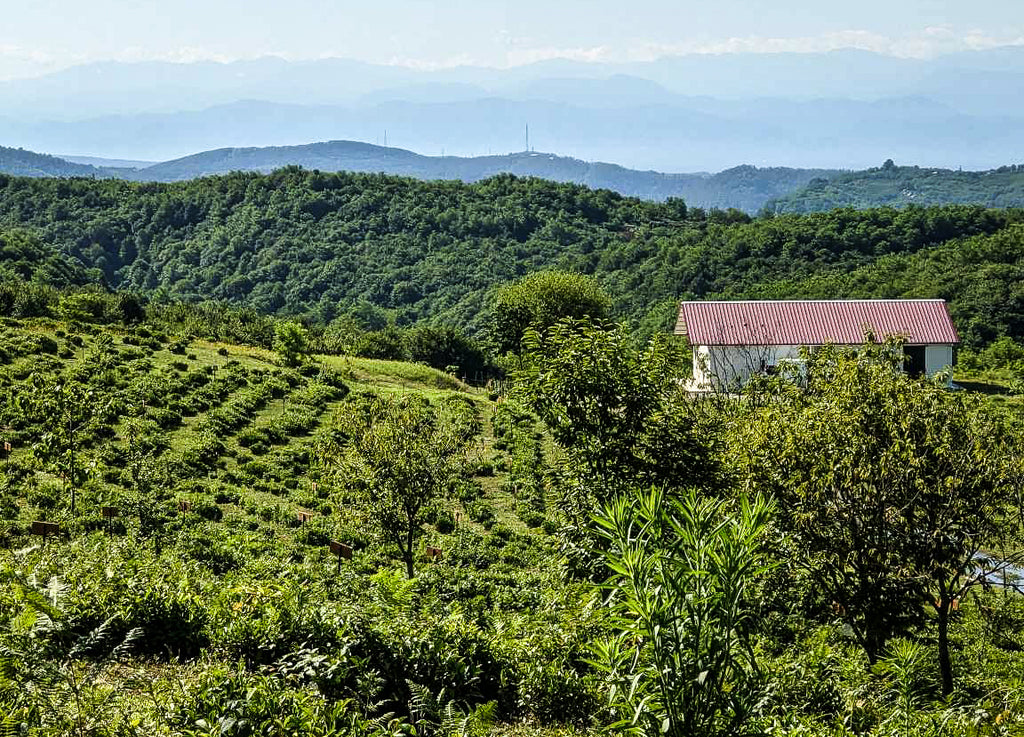Soviet Tea Grows Anew in the Republic of Georgia

Our new lots of Black Sea Breakfast and Golden Garden are a regional first for In Pursuit of Tea. Hailing from the Republic of Georgia, they represent the beginning of our foray into the Caucuses, a place with a surprising tea history dating back to the 19th century. These distinctive teas even have a role in revitalizing a nation's tea industry!
If you think the English drink a lot of tea, pay a visit to Eastern Europe and Central Asia. Per-capita tea consumption in these regions ranks among the highest in the world, and in the planned economy of the USSR, someone had to fill hundreds of millions of citizens' pots with something good to drink. Some of the Soviet Union's premium tea came from Darjeeling; industry veteran friends of ours tell us that back in the day, the USSR was the largest single purchaser of tea from Darjeeling's estates. But for a more affordable, workaday cup, government officials opted for a homegrown product. Cold-hardy varieties of tea had been cultivated in Georgia since the 19th century, and it was decided that the western part of the republic would become the USSR's tea basket. By the 1980s, the Georgian tea industry was one of the largest in the world.

Then, practically overnight, it collapsed: The dissolution of the USSR in 1991 took Georgia's tea business with it, and within five years, production fell to unsustainable levels. Tea fields were uprooted or abandoned; farmers struggled to find work. Generations of tea-making knowledge slowly evaporated.
Developments in Georgian tea remained largely dormant until a few years ago, when a cadre of friends who worked together at a local transportation company decided to do something crazy: find and restore Georgian tea fields to their former glory, with the goal of making high quality tea to sell to buyers around the world.
Their efforts became the foundation of Renegade Tea Estate, an organic producer with 100 acres of tea plants divided among three gardens in the municipalities of Tskaltubo and Tkibuli. Scouting locations took two years of driving and panning over satellite images on Google Maps, co-owner Hannes Saarpuu tells us. Once the partners secured leases for the land from the Georgian government, they began the arduous work of preparing the neglected fields for cultivation. Some plants had overgrown into miniature tea forests; others were suffocated by ferns and blackberry thickets.

Nobody on the Renegade team had any prior experience with tea farming, Saarpuu explains. They hired a consultant from Nepal, sought advice from farmers in Taiwan and Sri Lanka, and "watched many YouTube videos." Experimental batches gave them a sense of what methods worked and what needed improving. Slowly, the unique character of their teas began to take shape.
The vast majority of Renegade's pluckers and production workers hail from nearby villages. The Georgian tea industry's collapse was hard on these agricultural towns, and for decades, steady work was difficult to come by. A handful of these workers still remember the Soviet days, and Saarpuu says they figured the Renegade team would give up after a season or two, the way other young upstarts had in the past. As of 2024, though, Renegade Tea Estate has been successfully making tea for more than five years, and the company hopes to further bolster economic development in the region.
And how does it taste? Black Sea Breakfast is an impressive breakfast black tea with long, twisted leaves, which initially offer a rich, Dutch cocoa aroma and unfurl to reveal layers of molasses, orange blossom honey and toasted almond when infused. Flavors of bittersweet chocolate and rosemary are matched by a sweet grain aftertaste and silky texture. If you're a fan of our Assam and Mao Feng, give this special tea a try.

Golden Garden is named for the legend of the golden fleece in the ancient Georgian kingdom of Colchis (the area where Renegade is located today)—a prized item sought by Jason and his team of Argonauts in Greek mythology. Golden fleece iconography is common in Georgia, where archeologists say ancient peoples actually used swatches of fleece fabric, stretched on wooden frames, to pan streams for flakes of gold. The name is also our nod to the quality of Renegade's gardens. One advantage of a tea field being abandoned for 25 years is the notable absence of pesticides and chemical fertilizers in the soil. Renegade continues this practice, relying on the region's chilly nights and natural biodiversity to keep their tea plants healthy and free of pests.
The tea we call Golden Garden represents a new chapter for Georgia's tea history. It's a green tea, unusual for a place once dominated by black tea production, and it's one of the original styles that has endured through Renegade's trial-and-error development. The long, wiry leaves open with a sweet and savory aroma, calling to mind honey, linzer cookies and seaweed. Reminiscent of a Chinese green, but with more fruitiness, it finishes with a round, full texture.
We hope you savor these fascinating teas, and that you'll join us in raising a cup to the rebirth of Georgia's historic tea heritage!
Try our Black Sea Breakfast and Golden Garden
Farm photos courtesy of Renegade Tea Estate.
